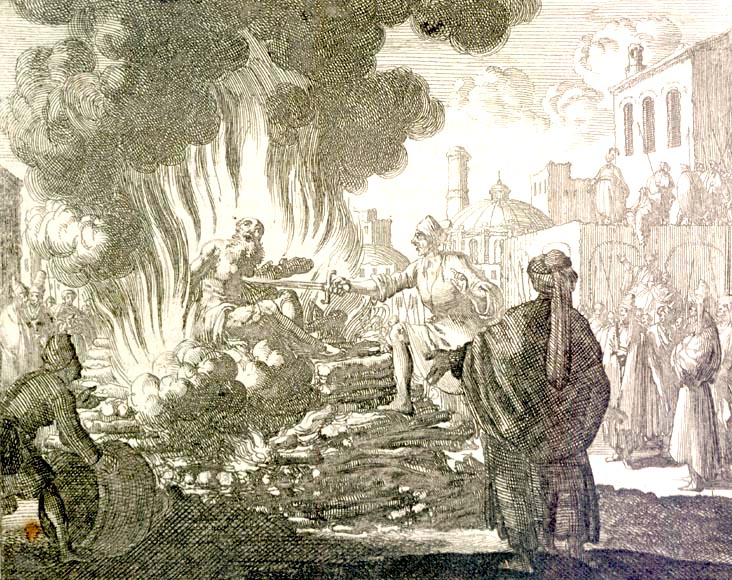Because pop-Christianity runs down stream a few years from the culture, thanks to Twitter, the bread and butter of Evangelicalism these days seems to be this wild, incoherent, seemingly-inebriated version of Hunger Games or Fortnight or whatever violent entertainment the kids like these days, where the main character (the Evangelical) and his clique tries to be the last ones standing through a series of OWNS, POWNS, trolls, straw men, and one-liners.
It’s exhausting, just like my previous sentence, and it does relatively nothing to build up and edify the church as a whole (like those previous sentences). These drive-by “owns” are impossible to keep up with, and why would I even try? My brothers and sisters at Princeton Bible Church certainly don’t need to know about Reformed-Twitter drama, and I don’t have the brain-capacity or emotional where-withal to handle it, either.
I want to avoid tribalism when I can — this carnal desire to build an echo-chamber so as to never have to deal with the text of Scripture (this isn’t good) — though I realize “there must be factions among you to show which of you are approved (1 Cor. 11:19).”
I’m concerned with whatever erodes the authority of Scripture in my peoples’ minds at PBC, and, if I have a chance to help the Bride Universal out at the same time, terrific. I’m simply not willing to give you or my people what I am now coining “The Hermeneutic Safe Space.”
The Hermeneutic Safe Space
The Hermeneutic Safe Space is a very special, quiet place where one can go if he or she wants to avoid the author’s intent and purpose in a text but still feel spiritually “full.” In this hermeneutic safe space, we, the people, are not allowed to bother or object to this poor text’s bad, unsanctioned interpretation. It’s off-limits to do so. You and I, though we desire to “rejoice in the truth” rather than “encourage a lie,” must give space, even though this individual is being disobedient to the text at hand.
This is what I care about. I don’t care about “owning” or “powning”, and neither does Christ. I care about others responding to the Word of God as taught by God. I want people to know what God means by what he says so other people, who were once confused, can “rejoice in the truth” along with me.
The goal in sound Bible study is to dig down to the base level in every text and understand the “author’s intent.” Only when we reach this point can we truly make good and right application for our lives. Imagine that I tell my 6 year-old to do the dishes before he goes to bed. This is a simple and clear command. I spoke, he responded. However, an hour later, he comes back to give a report on his work.
“Dad,” Carson says. “I brushed my teeth and took a shower. Can I get a snack now?”
My command demanded the correct response. There was a clear and obvious intention behind my words, “Do the dishes.” He missed it all though. Maybe he got lazy or distracted — he simply didn’t do what I asked.
What would and should my response be. It would be something like, “You did a good thing, son, but you didn’t do what I asked. You didn’t obey my words. You, in fact, disobeyed.”
When we unmoor a text from the author’s intent, we do the same thing my six year-old did. We might do something totally good, but it wasn’t what the author, under inspiration of the Holy Spirit, asked us to do with the text. It wasn’t his overall purpose or the thrust of the passage. So, when we ignore the author’s intent and find our own hermeneutic safe space, even when we do something nice, we are still being disobedient children.
We’re undermining God’s authority when we apply a text in ways the original author never dreamed of, and, instead of finding life in abundance, we’re finding death. This is why we work so hard at studying the Bible, and this is why we warn others away from Beth Moore.
A Pattern of Undercutting Scripture’s Authority
According to the Living Proof Ministries’ website, “Beth founded Living Proof Ministries in 1994 with the purpose of teaching women how to love and live on God’s Word. She has written numerous books and Bible studies that have been read by women of all ages, races, and denominations. Through the years, American missionaries and expatriates have taken the Bible studies overseas, resulting in Beth Moore Bible study groups popping up all over the world.”
“Beth taught an interdenominational weekly Bible study for women in her city at Houston’s First Baptist Church for 15 years.”
All personal quirks aside (Heaven knows we all have them), I’m concerned with whatever erodes the authority of Scripture in my peoples’ minds. Yes, she claims to have had zany visions, and she fellowships with all kinds of false teachers, but my problem is way more fundamental and basic than this. Beth Moore’s zaniness is rooted somewhere, and it starts here: a person becomes particularly dangerous to the Christian community when they claim to be an expert on teaching the Bible while, at the very same time, undercutting the authority of the Bible. This is exactly what Beth Moore does when she makes the Bible say what it clearly isn’t saying. Beth Moore consistently un-Moore’s the interpretation of a text from the author’s intent. When a teacher does this, they become the authority.
This, from CARM.org:
“Let’s take a look at a few of the many examples of Beth Moore’s improper biblical interpretive practices.
- Quote: Speaking of the demoniac of Matt. 8:28-34, she says, “before we proceed to the next point, consider a fact revealed in verse 27. The demonic didn’t live in a house. He resided in the tombs. I wonder how many people today are living “in the tombs”? I know a woman who is still so oppressed by despair that decades after the loss of a loved one, she still lives “in the tombs.” (Jesus, the One and Only, by Beth Moore, B & H Publishing Group, Nashville, Tenn., 2002, p. 143-144)
-
- Response: The biblical text is about Jesus’ authority over the demonic realm, not about people living “in the tombs.” The two demoniac’s that were living in these dark places were exceedingly violent (v. 28). They said to Jesus, “What do we have to do with you, Son of God? Have you come here to torment us before the time?” Jesus then commanded the demons in these two men to leave, and they went and entered into swine (vv. 31-32). The point of the text has nothing to do with people who are held in bondage by emotional traumas. Beth’s allegorizing the text to make it fit her need is a wrong use of the text.
- Quote: “as stated in the introduction to this book, we may not always be sure God wills to heal us physically in this life of every disease or prosper us with tangible blessings, but He always wills to free us from strongholds. You will never have to worry about whether you are praying in God’s will concerning strongholds. “It is for freedom that Christ has set us free” (Gal. 5:1). (Praying God’s Word: Breaking Free from Spiritual Strongholds, by Beth Moore, B&H Publishing Group, Nashville, Tenn., 2009, p. 36, italics in original)
-
- Response: The context of Gal. 5:1 is dealing with being under the law (Gal. 4:21). Paul contrasts children under the law and “children of promise” (Gal. 4:28). Paul was warning the Galatians about being enslaved to the Mosaic law, which is why he says in the next verse “… that if you receive circumcision, Christ will be of no benefit to you.” Beth Moore has improperly applied a verse, taking it out of its original context and meaning, and used it in a manner for which it was not intended — as the biblical context demonstrates.
- Quote: After writing about literal Barbie dolls used in churches, put in pews, with hands lifted up, she mentioned how one of them had a gnawed off leg. “Though the group didn’t know it, they’d hit the nail right on the head, or maybe the leg right on the stump. That was me all right. No, I don’t have a missing leg, but if you could see me with your spiritual eyes, surely at least one of my legs was gnawed off at the knee. Ephesians 4:27 warns, “Do not give the devil a foothold.” Uh, too late. Satan has wounded me, but he hasn’t devoured me. He got the leg, but he’s never gotten the thigh, though goodness knows he wanted it. I may walk with a spiritual limp, but thanks be to God, who holds me up and urges me to lean on Him, at least I can walk. So can you.” (get out of that pit: straight talk about God’s deliverance, by Beth Moore, Thomas Nelson, Nashville Tennessee, 2007, p. 87)
-
- Response: The context of Eph. 4:27 is this: “Therefore, laying aside falsehood, speak truth, each one of you, with his neighbor, for we are members of one another. 26 Be angry, and yet do not sin; do not let the sun go down on your anger, 27 and do not give the devil an opportunity. 28 Let him who steals steal no longer; but rather let him labor, performing with his own hands what is good, in order that he may have something to share with him who has need.” The stronghold in Ephesians is about sinning in anger or theft, etc., something the devil can use against us and others. Beth Moore’s “spiritual eyes” about being gnawed off at the knee and not giving the devil a stronghold, have nothing to do with the text. Beth should not take any text that “might” look like a phrase that could fit a “spiritual” lesson and then use it to make a point. She is failing to exegete Scripture properly. She is teaching to just apply verses willy-nilly in whatever direction seems fit. This is dangerous.”
I will continue to warn my people (and you) away from Beth Moore because God’s Word demands that we must know it and apply it with precision. God tells us what He means by what He says, and this is anchored in the intention of the author. Beth Moore purports to do this, but she clearly doesn’t, leading thousands of women (and men) to be disobedient children and lazy exegetes. By consistently ignoring the author’s intent and rejecting correction, she’s built her own Hermeneutic Safe Space, transferring Scripture’s authority to herself while showing others how to do it too.





unsubscribe
Excellent article! Thanks so much for this!
Thank you for reading, Kristy! I pray it will be a helpful resource.
I loved reading this! I have always felt uneasy when doing Beth Moore studies but I haven’t been able to pinpoint what I haven’t agreed with. This has helped me to clearly see why I don’t always agree with her and others. Thank you for taking the time to write this!
Well, praise the Lord, Charity. Thank you for taking time to read it. Here’s one other very helpful resource: https://michellelesley.com/2014/08/14/updated-five-reasons-its-time-to-start-exercising-moore-discernment/
I THINK YOU are also at fault…Just wanting to make Beth Moore look bad.. well you cannot
Can you expand on your reasoning?
Did you read the post, Louise?
Right!? Just giving a different interpretation doesn’t make the other one wrong. Wow. Just fishing for something so people will read it. I would say “poor Beth”, but really, she’s not the poor one. 🙂
I’ve attended a Beth Moore study in the past. It made me so anxious that I quit after two sessions. Now I know why.
I’m glad this post was helpful, Mary.
Just about every televangelist or popular preacher has spoken as Beth Moore has with allegories but they aren’t as vilified as she. It is the Holy Spirit’s job to teach, instruct, and convict – not ours. We are called to love God first and others as we love ourselves. Maybe that is the problem, we don’t love others as we do ourselves. We are too busy pointing fingers at the wrongdoers instead of teaching The Word correctly ourselves. We were never instructed to call out, ridicule, work to change other people’s spiritual focus, or deride a preacher/teacher for producing “lazy exegetes”. No one is “your people”, we are God’s people. Warning others to stay away from any preacher still doesn’t turn anyone TO the truth of Scripture. It is our job to share the Gospel and the Holy Spirit’s job to do the rest.
Thank you!
I appreciate your response, Anji. My goal with the post was not to vilify her, POWN, or OWN her. Beth Moore has to be pointed out, and will continue to be, because she is a part of the SBC, and, unlike the rest of those televangelists, claims to be one of THE premier Bible teachers of our day. 99% of Reformed churches don’t have Joel Osteen books on their shelves, but most of them have Beth Moore Bible studies. The problem is, when you don’t apply a text the way the author of the text intends it to be applied, you mislead people into disobedience to the text. She, because of her wide audience, misleads thousands. Hope this helps too: https://michellelesley.com/2014/08/14/updated-five-reasons-its-time-to-start-exercising-moore-discernment/
I’m wondering – Beth Moore and all the other “false” teachers you WARN about are interpreting the Word wrong, but YOU interpret it right. Did I get that right? 🙂 So you and you alone have the RIGHT interpretation of God’s Word, so YOU have the authority to WARN others? I’m in awe. (Even though I know my comment will not make it past “moderation”. That’s ok.)
Jude teaches us to fight for the truth. Epehesians teaches us to expose the darkness. We are called first to love the Lord our God before our neighbor. Why? Because we can’t properly love our neighbor without loving God as we should. And loving God calls for worshipping and fearing Him above man. Let me just say this, sitting under false teachers cost me over 20 years of my life until someone shared the truth with me by exposing those I was under and taught by. Few are those who desire to fight for the truth of whom is Jesus himself, many are those more concerned with man and man’s feelings.
Exactly, Anji. Well said.
The demand of the publishing house often forces writers to fill in gaps to produce the necessary pages. It isn’t just Beth we should some times avoid, but her publishing house.
This is certainly true. Thanks Kelly.
You sir , have way too much time on your hands. Why don’t you focus reading God’s word the way it was intended, and teach to your congregation. Stop hiding behind “I’m just trying to warn people about false teachers.”
My email didn’t get entered correctly .
I have been in many churches and in many Bible studies, and every church and preacher I have ever heard uses the scripture in a way that makes the particular doctrine of the church shine. I’m not saying Beth Moore is innocent, but I am saying you should list every denomination and every Bible study because even the materials used are geared toward each denomination and their doctrine.
I appreciate the interaction, Glynn.
“You should list every denomination and every Bible study because even the materials used are geared toward each denomination and their doctrine.”
There is truth here. I am not a proponent of pre-packaged Bible studies, because they a) lead to Biblical illiteracy in individuals, b) lead to laziness in our own personal studies, and c) probably shouldn’t be geared toward denomination or specific pet-doctrines. I would rather my people at PBC study the Bible on their own so much they could lead their OWN studies, study hard, and let the text actually speak for itself, rather than interpreting it with presuppositions.
However, it would be impossible to list all lazy exegetes in our world today. I pick her because she claims to be one of the premier Bible teachers in the world and 99% of churches have her books sitting on their shelves.
Seventh Day.Baptist also use Women pastors.. Seventh day Adventist do not.
I personally don’t care for Beth Moore studies, but I feel the criticism given her in this article is not worth tearing her ministry down. I have heard her give some extra insight of her own, as mentioned, but no more than any other teacher, and she goes right back to the scripture so you know when she is expounding on her own. Christians are sometimes the worst at shooting their own. In all fairness, I expected to hear that she had done something really terrible. Maybe I’m missing something here, but I don’t see that what she is accused of in this article is any worse than tearing down a ministry that may very well be of the Lord.
I just want to point out that it’s PWN, rather than POWN.
Do you even online game, bro?
I totally almost changed that when I edited the article but figured Justin meant it that way cuz he’s way younger and hipper.
The clearest example of Beth Moore’s false gospel can be found in John Haller’s video titled “The Stream of Ecumenism” (along with many others) found on utube. Please watch it. She’s dangerous and insidious in her pretzel logic to deceive those listening to her. Pay close attention to her way of claiming and teaching those clinging to the true gospel as being misled==evil.
I think it’s because she didn’t go to seminary or bible college and have these things repeated in her learning.
It’s similar to those in helping profession but who don’t have an advanced degree. They can still help people but it doesn’t sound write to those who have the degree.
I have studied Beth Moore’s Bible studies for years. They are the ones that have touched my life the most! A few years ago I started noticing Christian women turning up their noses at the mention of her name. I wondered why. Then I started doing research online to try to understand it. Well I’ve now done the research and I have to say that “Christians are known to eat their own,” and what happened to Beth Moore is a perfect example of it! Anyone who rises to her level of popularity and fame, is threatening to others. Just look at what’s happened to Rick Warren, Kay Arthur and Priscilla Shirer! God forbid!
Matthew 7:2 says “For in the same way you judge others, you will be judged, and with the measure you use, it will be measured to you.”
I say, “Thank you Beth Moore for enriching my life through your Bible studies and keep up the good work!”
So well put, Melinda! Thank you. I’m right there with you in how much she has helped me over the years, along with others.
The point I don’t agree with you about is “authors intent”. How could you be the authority on that? How could you know for sure Beth’s interpretation of the Bible is NOT the authors intended meaning. You are placing yourself above Beth and also the author by proclaiming knowledge of the intent.
Thank you!
Yikes. Nitpicking and missing the forest for a twig. I pray you are not a stumbling block to others in this matter. May God have mercy on you.